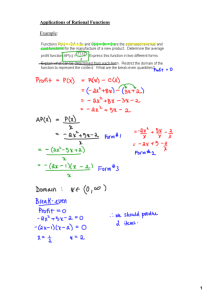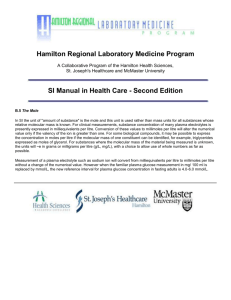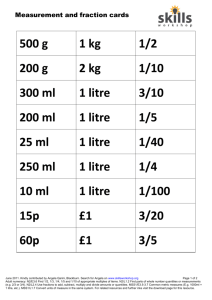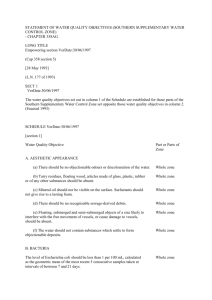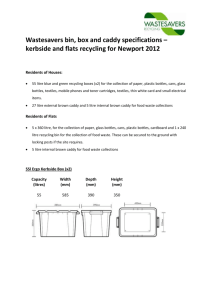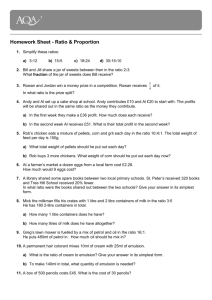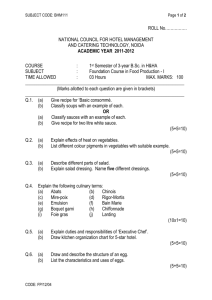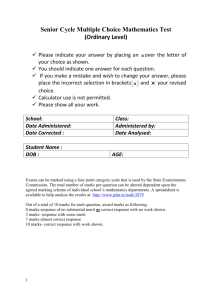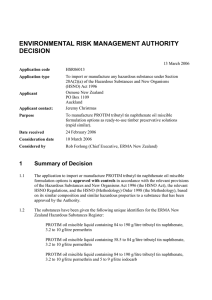NC State's QEP - Western Carolina University
advertisement
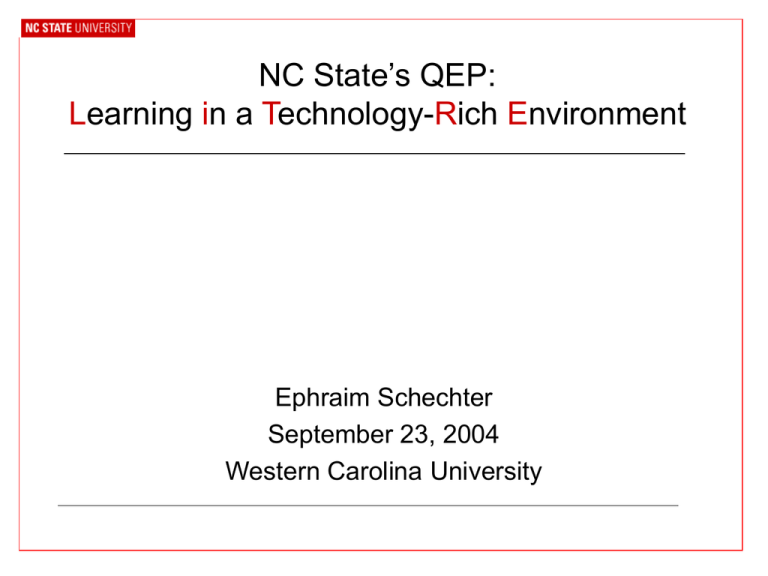
NC State’s QEP: Learning in a Technology-Rich Environment Ephraim Schechter September 23, 2004 Western Carolina University LITRE Today’s topics • What’s LITRE? • How we got there • Tips from our experience LITRE is... • Applied research • Technology-enhanced approaches to teaching/learning are: • Explored • Assessed for impact • Results inform broader deployments, future projects LITRE website: http://litre.ncsu.edu Major themes • Students/faculty engage with technology for learning/teaching • Impact on student learning outcomes • Supportive technological/pedagogical environments LITRE projects link to… • General education goals • College / department / program / course curriculum objectives • Outcomes-based academic program review First initiatives • Monitor faculty/student experiences & attitudes • Document campus classroom technology • Classroom/course-based pilot projects • Faculty grants for new projects Details available on LITRE website Management • Directed by a faculty member • Experienced in LITRE areas • On full released time as Special Assistant to the Provost • Faculty/staff Advisory Board • Special-purpose committees How we got there: Choosing the topic • Small planning group identified potential project areas • Deans & key groups winnowed the list • Executive officers selected LITRE • Campus groups developed the details Guidelines • Related to student learning • Achieves something we want to achieve • Supported by assessment, with assessable impact • Engages the academic community • Capacity/commitment for 5+ years • One topic is better than two • Don’t highlight compliance issues Tips from our experience • Some projects are already too far along • Don’t interfere with existing projects • Everyone wants to be involved but umbrella topics aren’t manageable • Emphasize a strength Developing the details • Started at same time as Compliance Team • Selected topic • Created “LITRE Team” to develop it • Co-chairs: faculty member, IT administrator • Small “Leadership team” plus • Steering team • Advisory committee • Topical work groups Developing the details • Work groups • Review campus resources/issues, peer institutions, literature • Propose approaches, projects • Areas • • • • • Educational infrastructure Student information fluency Faculty engagement Learning resources / educational technology E-learning environments Developing the details • Faculty survey informs work group discussions • Campus forums respond to work group reports • Early: issues & wish lists • Later: specific proposals • Advisory committee / steering team winnow proposals • Potential for immediate impact • Existing campus involvement • Probable funding constraints • Provost and Chancellor decide what to fund Writing the report • Editorial board & writer • Near the end of the development process • Combine/summarize preliminary reports • Adapt rationales, etc. from campus presentations • Edit for consistent tone Available from LITRE website Tips from NC State’s experience • Everybody wants a piece of “the QEP pie” • Build assessment in from the beginning • Develop management structure as you go • Leave plenty of time at the end to • Negotiate final selections, budget details, etc. with your executive officers • Get feedback on final draft(s) Tips from NC State’s experience • Process or project? • Don’t leave “exercise for the reader” • “Insiders” make assumptions • Have “outsiders” review the drafts • Workgroup size • Small groups are easier to manage • Large groups give more campus involvement Think about… • What does SACS want? • What are your current issues? Which ones can be turned into effective QEPs? Why? • What planning approach fits WCU’s style? LITRE website: http://litre.ncsu.edu Ephraim I. Schechter, Ph.D. University Planning & Analysis North Carolina State University 919 / 515-2776 eischech@unity.ncsu.edu
